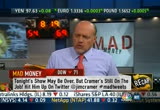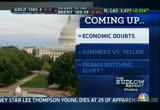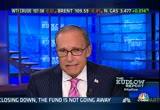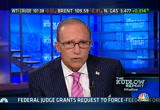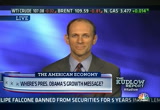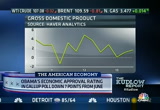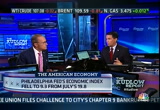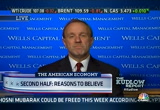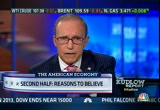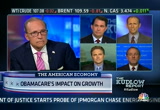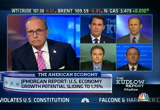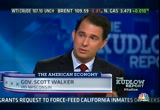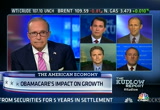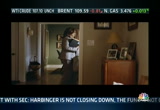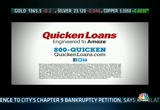tv The Kudlow Report CNBC August 19, 2013 7:00pm-8:01pm EDT
7:00 pm
did retail get too hard hit? tonight, urban outfitters reports a pretty good number. but then the stock just zooms. why? the shorts may be scrambling. there's always a bull market somewhere, i promise to try to find it for you here on "mad money." i'm jim cramer, and i will see you tomorrow! what makes all the economists out there think there's going to be a second half growth rebound? you know what? i think bad numbers and bad policies are sinking that scenario. former obama adviser austan goolsbee is going to defend his man, but wisconsin governor scott walker will be here and take goolsbee to the woodshed.
7:01 pm
also, is obama man larry summers really jacking up on rates and knocking down stock prices? will he really be a tighter-fisted fed chairman than janet yellin? the markets seem to think so. but wasn't summers the big trillion-dollar stimulus spending guy in obama's first term? and speaking of fears, has team obama totally botched the egypt situation? there can be no compromise here, folks. american interests lie with the egyptian army, not with the radical and terrorist muslim brotherhood. all those stories and much more coming up this evening on "the kudlow report." beginning right now. good evening, everyone. i'm larry kudlow. this is "the kudlow report." first up tonight, after delivering a number of economic growth speeches this summer, president obama has still failed
7:02 pm
to provide any economic growth message. in fact, the tax, spend, and mandate obama care plan is a huge drag on the economy. and on top of that the president's idea of corporate tax reform is really a tax grab for all his pet spending projects. there's no sign of the keystone pipeline. an epa war against coal and fossil fuel. and a double whammy of investor tax hikes and new regulation. so i ask why should the second half of this year's economy grow any faster than the nearly 2% growth of the first half? why? i don't see it. and in july numbers they were very mediocre. and if the fed makes any move at all, and i think they shouldn't, it's going to be a sliver. not even a taper. now, the president obsesses about income ineke waultd, but he says nothing about economic growth policy that's would create a rising tide that would lift all boats, which is what we need. i'm honored to be joined for the
7:03 pm
full hour tonight. wisconsin republican governor scott walker, who knows a thing or two about budget cutting, pro-growth tax reform, and job creation. also with us, the equally formidable president obama's former chair of the council of economic advisers, that being austan goolsbee. he is now a professor at the university of chicago booth school of business. he's going to to defend all of obama's command and control policies. and we have jim peth kooukas of the american enterprise institute who writes the problem is slow growth, not overly rich ceos. and jim paulson, chief investment strategist with wells capital management. welcome, everybody. i begin with my pal austan gals booe. because of obama care, because of tax threats, because businesses are not willing to unlock their purse strings, is there any reason to assume the economy is going to get better in the second half? and the second half was about the same as the first half,
7:04 pm
which is lousy. and this whole recovery is the worst recovery since world war ii. >> okay. first of all, you're lucky you've got jimmy p. over there defending you because if i was here i'd be coming after you. but look, i have not been a big bull for the calendar year 2013. not at all. i think the u.s. growth rate has been modest. it's faster than almost anywhere else in the advanced world. this is a world economy phenomenon, not a u.s. economy phenomenon. so if you're trying to to tribute something to u.s. policy i think you've got to explain why is it doing even worse in places where they aren't following those policies? >> but austan, you were one of the distinguished designer architects of the policy, and by your own acknowledgment, and i always respect you for acknowledging that, this has been a very slow, sluggish, anemic recovery, and it shows no signs of improving. how do you defend that? you designed this thing. >> now, wait a minute.
7:05 pm
what i have said before and i will reiterate is that this recovery looks nothing like 1984 but looks very much like 2001. and that is because it followed on the popping of a bubble. you can only have a v-shaped big style old-timy recovery if the economy can go right back to doing what it was doing before. but what we were doing before was overconsuming and building houses, and we can't go back to that. that was a bubble. it's totally unrealistic to think we could. >> all right. governor walker, what is your response to the distinguished austan goolsbee? >> well, it's real simple. employers need certainty. i hear it all the time as a governor. i know other governors hear it around the country. we need certainty. and the fact is employers aren't seeing it. it's because the political pressure of the pushback on the employer mandate but there's still incredible uncertainty about the so-called affordable care act, which we believe by any number of measures will show anywhere from 80% or more increases in premiums going into the next year. that is tremendous high cost for
7:06 pm
small businesses, mid-size employers, states like wisconsin, others across the country. they cannot afford to have those sorts of increases. at the same time they can't afford to have the kind of uncertainty that's come with the affordable -- >> businesses in wisconsin are particularly interested in small size business -- >> where the job growth is. >> right. are they pulling back on hours worked? are they pulling back on permanent hires? because we are seeing that around the country. >> we see it on hires in general. we see it if they hire at all it's going many cases to part-time. it's going to seasonal employment. it's other things to try and get around. and it's not just people who historically told us they didn't like the affordable care act. it's people that are apolitical who just come out and say when i go out and visit these firms, these companies, these small businesses, we don't know what's going to happen next, we're not going to take that risk, even though we've got the potential to grow our economy, even though we've got a customer base that wants us to produce more, we're reluctant to go over the 50 mark, to go over the full-time rate. it all boils down to certainty. employers want certainty. >> jim pethokoukis, you heard
7:07 pm
austan goolsbee and you heard scott walker. i think mr. walker got the better of it, but we'll let austan defend himself. but my question to you, jimmy p., is where is the president's growth plan? he's been out and about. all right? i don't blame him for taking a vacation. it's before the vacation. he gave a bunch of speeches. i have yet to hear a growth plan, jimmy. when is one coming? >> i think we are not going to hear a radical change from what we've heard before, which is we need some more infrastructure spending. that was really -- when he gave his big economic speech or whatever if was a month ago that was really it. over the short term we need more infrastructure spending and over the long term, you know, innovation centers and education and all that kind of stuff. so i think we're not going to get a real growth plan, which is too bad because this economy is not growing very fast. it continues not to grow very fast. remember that the fed and the cbo and the white house keep predicting a big recovery just around the corner. 3%, 4% growth. we're not getting it, which --
7:08 pm
>> i've heard that for four years. i've heard that for five years. that's the thing. and i want to come to jim paulson. all right. very distinguished wall street economist and strategist. jim paulson, i'll give you one number. jobless claims. okay? they're low. and they look good. on the other hand, retail sales mediocre and same-store sales lousy. manufacturing falling. business equipment flat. housing starts falling. consumer confidence falling. i don't see where this great second half recovery's going to come from. and it sure isn't going to come from the policies. we have two tax hikes in there. i'm not even talking payroll tax. january 1st with the bush tax cuts were repealed at the top end and now the obama care tax hikes kick into place for investors. so where is this stimulus that's going to give us a great second half economy? >> well, i don't think it's really the government that's driving it, larry. i'd say it's more the private economy. i'm giving up on waiting for the government to do something to
7:09 pm
help us out. but i do see -- i agree that growth rate's slow. but i'll tell you what is different. it's a broader economy than it used to be. it's firing on more things than ever. it hasn't quickened the pace, but let's face it, we have housing this year where we didn't a year ago. we've got the steepest drop on a regular basis in the unemployment rate. we created over 200,000 jobs a month year to date, which is the best of the recovery. none of those numbers are great, but they're coming at the same time. we're also seeing evidence of the production sector, the manufacturing sector, which has been dormant, starting to pick up again with most of the ism numbers popping back up. at the same time -- >> i don't see it. can i with the greatest respect, all the years i've known you, i looked very carefully at that industrial production number because it is a very important number. in some sense the most important number the federal reserve puts out. guess what. manufacturing is falling. business equipment is falling. those ism numbers were seasonal adjustment glitches. what i'm saying is you put this
7:10 pm
whole package together, jim paulsen, i can't even get 2% right now. i hope i'm wrong because i don't want to be a scott market bear altogether. let me go to governor scott walker on this. obama care. i don't know what it is. wall street economists don't want to acknowledge the negatives on taxing and regulating and mandating and uncertainty about obama care, which is the single biggest obstacle to this economy in my humble opinion. >> well, you see it repeatedly. you see it from employers. the concern, both the uncertainty combined with the fact that it's not an affordable care act. at least it isn't for the vast majority of skates states in our country which are small businesses. the other key component is a problem particularly as far as this administration looks is their goal, their vision is to get more people signed up for unemployment benefits in overall government assistance. we need to get more money into the economy. you don't do it through higher taxes. you don't get it through more people signed up for government assistance. you get it through more
7:11 pm
resources back in the private sector. we empower people to control their own destiny. that's the real choice we have right now, is do we want more people dependent on the government or do you want true independence, independence from the government and greater free enterprise? >> austan goolsbee, as the designer of obama care, how do you answer governor walker? >> i appreciate you're going to give me credit for anything. but i could not disagree with you guys more. you're agreeing with each other, but the only thing that you don't have on your side are the facts on these. if you look at the way that economists normally try to go measure what's the impact of some policy, you want to say it has a negative impact on employment, let's compare the affected to the unaffected. so let's compare industries where almost everyone was already covered by health insurance like, say, aerospace, and let's compare that job growth to industries where not that many people were covered. if it's the affordable care act, then you should see a big difference in growth rates of employment in places where the
7:12 pm
mandate doesn't have an impact for where it does. you see -- >> retail sales, low-end wholesale -- >> if you break down the industries -- >> there is tremendous -- >> -- you actually see the opposite, larry. the industries that have had larger coverage in the past have actually been growing is slower. which is the opposite of what you should be seeing. >> but it -- >> here's something we should be even more scared about than the obama care impact, is that perhaps the potential of the u.s. economy for whatever reason isn't what it used to be. jpmorgan had a big report out, they don't think the economy can grow more than about 1.8% over the long term. productivity numbers have been terrible over the past furor five years. is there something deeper going on with this economy that it cannot -- >> i agree that's an important issue. i agree that's an important issue. but productivity numbers were phenomenally good during the recession. and so a lot of the slowdown of productivity is just because they squeezed every drop of
7:13 pm
blood out of the rock that could be squeezed and -- >> now, wait a minute. >> and that's when it slowed down. >> why aren't they doing the business investment spending, then? >> that's right. that's exactly where i was going. i was going to ask -- >> because demand around the world is only growing 2% max. that's the reason they're not investing. you've got a massive overbuilding -- >> less than 2% for the last 100 years for god's sakes. since bismarck has been growing under 2%. i can't take responsibility for that. businesses which create productivity, governor walker -- >> larry. >> -- by investing, they are not doing that. they've got cash, they've got profits and they're sitting on their hands. why is that? >> uncertainty. one of the best things we can do is get government to the greatest extent possible out of the way particularly at the federal level but to a certain extent at the state level, put the decisions back in the hands of the employers. instead of looking at ways to tax more you should put more money back in the hands of consumers, particularly small business owners, create certainty by getting a feeling and understanding for what's happening with the affordable
7:14 pm
care act and get it out of the way, and allow the market to go forward. i have great faith and confidence in the american people and the people of our states, but we don't do it by piling on more. and pesh tr the point he raised about the affordable care act. the american society of actuaries in our state alone expects an 82% increase in individual insurance premiums through -- >> wow. all that -- >> acknowledgment of certainty. >> austan designed this plan, and he will not acknowledge the consequences of this thing. >> if you take healthy young people buying currently in the individual market with no pre-existing conditions, it's true their prices go up. they pay the lowest prices of anyone in the market. if you look at an ordinary family, any of the, say, 180 million people who either have been sick or have a family member who's been sick, they are going to be paying less or at the very least have the increases in their health care growing at a slower -- >> that's a nice theory that's been talked about -- >> it's not a theory.
7:15 pm
it's in the data. >> look at my state in the next year and look at the difference. we can see the numbers. we see them through the insurance commissioner's office. we see what the numbers are in the private market. they're going up. they're going up 8 30ers -- >> we're going to hash through this another time. you're all great. jim paulsen, in fairness you buying or selling them? what are you doing? sfw >> i think it's a trading range through the end of the year. we go higher next year. >> that's a bearish statement from you. you're being realistic. 3% treasury paper is pretty attractive. that's all i'll say. jim peth yokoukis, thank you. jim paulsen, thank you. austan and the governor are going to stick around. the great larry summers versus janet yellen debate rages on. markets seem to think summers would bring a much more tight-fisted fed policy. and is this really worrying the bond market? well, who knows better than austan goolsbee? he worked with both yellen and summers, and he is going to tell us. and please don't forget free market capitalism is the best path to prosperity.
7:16 pm
before this show is over we're going to talk about some free market policies in the great state of wisconsin and elsewhere. i'm kudlow. please stay with us. jackie: there are plenty of things i prefer to do on my own. but when it comes to investing, i just think it's better to work with someone. someone you feel you can really partner with. unfortunately, i've found that some brokerage firms don't always encourage that kind of relationship. that's why i stopped working at the old brokerage, and started working for charles schwab. avo: what kind of financial consultant are you looking for? talk to us today. every day we're working to and to keep our commitments. and we've made a big commitment to america. bp supports nearly 250,000 jobs here.
7:17 pm
7:19 pm
are interest rates rising in response to the possibility of a tight money larry summers-led fed? the u.s. 10-year yield climbed another six basis points today after climbing six basis points on friday. that's when cnbc's john harwood broke news that a white house source calls summers' chances for fed chair as 2 in 3. so is summers really obama's first pick? austan goolsbee. all right. let's talk turkey. you know these guys very, very well. i am not going to let you worm out of this. question, would larry summers be more tightfisted than janet yellen as fed chair? by the way, my distinguished co-host governor scott walker is still here. go ahead, austan. is summers the tight-fisted guy the bond market is worried about? >> we never talked about monetary policy. that wasn't our -- that wasn't our thing. i think in the short run both yellen and summers strike me as pretty concerned about what the
7:20 pm
growth rate is. so i don't think the immediate term would be that different. i do think over a longer run, you know, it's kind of the classic case of the continuity versus the shake it up candidate. so you know, maybe they're -- maybe the market's attention is focused about more than just the next six months. >> but you're basically saying in terms of our last segment, where i argued the second half was going to be better than the first half, you're hovering less than two% growth. you're saying no matter who steps in they're going to go very cautiously. in fact, let me ask you this, austan. serious question. heth it's yellen or summers, maybe they'll leave it alone. with less than 2% economic growth, maybe they'll leave things alone. there ain't no inflation. >> look, i agree with that. that's what i think. i don't know why people are talking about the tapering. that has been based on the fed's forecast, which actually has been more optimistic than any of
7:21 pm
the cbo, omb. the fed has been saying we're going to get 3% growth for 2013 and 3 1/2% in 2014. i think that's an overstatement. so i think whoever comes in might leave it alone. they might do a little tapering first in the fall. bernanke would. but then you know, next year they may leave it alone. >> governor walker, in wisconsin now, i'm just going to do this in round numbers, interest rates are up, i don't know, almost 150 basis points. that's just in very round numbers. mortgage rates followed suit. is this having any effect from the economy? what are you hearing? >> the biggest thing we hear from employers is just access to capital. particularly from small businesses. it's one of the things where a lot of our community banks get frustrated with some of the changes that were made out in wall street. but you know, impactwise it's certainly something we look at but my sense is it was interesting to hear that. i don't know that there's a big difference -- you talked about continuity versus shaking it up. it sounds to me a little bit like it's going to be pretty much the same either way and for us more so than what happens
7:22 pm
here it's going to be what happens on main street and whether or not small businesses have access to capital. >> i hate to say this because they're two brilliant people, summers and yellen, but i think it's basically two peas in the same liberal pod. and what i mean by that, i don't mean to denigrate them, but they're not bound by rules. they're not bound, let's say, by a dollar rule or a commodity rule or a nominal gdp rule or anything like that. they fine-tune, they tinker. and that's what troubles me about the story for both of these guys. i don't think president obama's going to ask me, austan goolsbee, but i'm a rules-based guy. >> whatever you tell me i'm going to tell him. so you say right now and i'm writing it down. >> you know i had dinner with him once upon a time five years ago. he's a charming guy. >> he enjoyed that. >> he's a smart guy. it's just i can't agree with him on some of his policies, just a few. but what you're saying is very interesting. you really, a, don't think the fed should be tightening up at all now. and b, if they do it will be
7:23 pm
just a little sliver. >> that's what i hope. i don't think they should be tightening. until you see credible evidence that the economy's gotten out of the rut and we're back to at least trend growth, 3% nominal growth, if you started to see that on a continuous basis, fine. then the economy's going to be in a situation where unemployment's going to be coming down strongly and we'll be putting up jobs numbers. but i don't think we've been doing that. so i think people need to be real careful. with the fiscal drag we've got and you add on top of it that the world's not giving us any boost and then you add on top of that that we're going to start to taper, i'm a little nervous for the second half. >> we should be nervous. do you want to end this? >> the end, the biggest thing i'm nervous about is not just the fed. it's the federal government getting more involved in our economy. the best thing we can do is let the private sector drive it. >> like the sound of that. austan goolsbee, i sincerely hope you heard what governor walker just heard in his concluding remarks. now, austan, you're great. thanks for coming back on the show. >> thank you.
7:24 pm
>> i know governor scott walker's going to want to weigh in on this one. we have an update on a key deadline tonight in the detroit bankruptcy story. we have that and other headlines of the day just ahead on "the kudlow report." please stay with us. [ female announcer ] what if the next big thing, isn't a thing at all? it's lots of things. all waking up. connecting to the global phenomenon we call the internet of everything. ♪ it's going to be amazing. and exciting. and maybe, most remarkably, not that far away.
7:25 pm
we're going to wake the world up. and watch, with eyes wide, as it gets to work. cisco. tomorrow starts here. (announcer) at scottrade, our clto make their money do more.re (ann) to help me plan my next move, i take scottrade's free, in-branch seminars... plus, their live webinars. i use daily market commentary to improve my strategy. and my local scottrade office guides my learning every step of the way. because they know i don't trade like everybody.
7:26 pm
i trade like me. i'm with scottrade. (announcer) scottrade... ranked "highest in customer loyalty for brokerage and investment companies." and then another. and another. and if you do it. and your friends do it. and their friends do it... soon we'll be walking our way to awareness, support and an end to alzheimer's disease. and that? that would be big. grab your friends and family and start a team today. register at alz.org today is the deadline for challenges to detroit's bankruptcy plan. now, you knew someone was going to object. well, cnbc's josh lipton is here to explain what happened and
7:27 pm
some other headlines. evening, josh. >> hey, larry. yeah, there were about 30 objections to the bankruptcy filed with the court. one of those groups, the detroit municipal employee union, which said the filing violated the constitution. here is what happens next. the city has a few weeks to respond to the challenges, and a hearing on whether the bankruptcy can move forward scheduled for late october. next topic, an editorial from the "chicago tribune" this morning. here's the title. how president obama is flouting obama care. and the subheadline says "more reasons to delay and rewrite this ill-conceived law." the editorial board blasts the president for picking and choosing which parts of the law to enforce. therefore, helping some people but hurting others. and lastly, phil falcone and his hedge fund harbinger capital reaching a settlement with the s.e.c. they will pay $18 million and admit wrongdoing. falcone is banned from the securities industry for five years.
7:28 pm
falcone telling cnbc that the fund will not close down and he's happy to put this behind him. larry, back to you. >> i'll bet he's happy to put it behind him. josh lipton, thank you very much. governor, we're going to come back and get into a bigger discussion with you, but right now just a moment, in a sentence, in a word, okay? what's the difference? where did detroit go wrong and wisconsin go right? this is the short form. >> we put the power in the hands of the hard-working taxpayers instead of the big government union bosses. >> and they never took on the union bosses, did they? >> not at all. not in detroit they didn't. and those are the ones that ultimately have their hands on that crumbling city. i give rick snyder credit, the governor there, for standing up and saying we've got to do something about this. >> and you think the objections from 30 municipal unions, which is no surprise, you think that's going to work or is this going to be thrown out? >> no, i think in the end it's going to be thrown out. you've got to he can power the taxpayers to be in charge. >> we've got a million other questions about this and other things on the other side of the
7:29 pm
break. please stay with us. governor scott walker of wisconsin will be here. hero: if you had a chance to go anywhere in the world, but you had to leave right now, would you go? man: 'oh i can't go tonight' woman: 'i can't.' hero : that's what expedia asked me. host: book the flight but you have to go right now. hero: (laughs) and i just go? this is for real right? this is for real? i always said one day i'd go to china, just never thought it'd be today. anncr: we're giving away a trip every day. download the expedia app and your next trip could be on us. expedia, find yours. a quarter million tweeters is beare tweeting. and 900 million dollars are changing hands online. that's why hp built a new kind of server. one that's 80% smaller. uses 89% less energy. and costs 77% less. it's called hp moonshot. and it's giving the internet the room it needs to grow. this&is gonna be big.
7:31 pm
7:32 pm
collective bargaining and inserted more fiscal discipline than anyone dreamed possible in wisconsin. he was duly elected governor in the first election. then he was elected again by a wider margin in a recall election. in fact, wisconsin's fiscal revival could deliver a big boost for the state's bond rating. but just what is the cause of wisconsin's recent economic turnaround? you were all around the rating agencies today, is that right? >> absolutely. >> you also had a night article in one of the magazines, manufacturing is coming back in wisconsin. basically you're in surplus now as i understand it. >> that's right. we went from a $3.6 billion deficit to more than half a billion-dollar surplus. four years ago when my predecessor was here in town talking about it they had a cash balance of just over 25 million. today we have a cash balance of $1.8 billion. a tremendous turnaround. rainy day fund's the largest ever. yet we still were able to invest more fund into tax cuts in major
7:33 pm
industries in the state to get the economy going. >> before we get to the tax cuts let's go back to the collective bargaining debate. you put strict limits on collective bargaining as i recall. and a lot of governors are afraid to do that. it's not like wisconsin is some crazy red state. you're a middle of the road state. and you were able to do that. how important to the turnaround in your fiscal fortune was the collective bargaining restraint? >> oh, you couldn't have done it without it. there's the difference between austerity and reform. a lot of times here and in washington people talk about austerity. what you really need to do, i believe, in our states and in our nation's government is reform. we made things work better. we didn't just cut things. if you cut things, then things that we genuinely need to have happen get cut just as much as things that don't. we reform things, we put things back in the hands of the taxpayers. let me give you a good example. not just the state level but before under collective bargaining most of our school districts had to buy their health insurance from just one company. today because of reforms they can bid that out and that's
7:34 pm
saving them tens of millions of dollars. that's money that goes right back in the classroom. that's real reform that isn't just about cutting spending, it's about making the government work better. >> just basically a couple other points on this. you are not participating in what may or may not be obama care. i don't know if the thing's going to die of its own weight or not. you're not buying into the medicaid expansion. you're not buying into the insurance exchanges. >> don't have a state exchange. that's correct. >> tell me why. >> for us it's state in name only. it's really a federal exchange. they put the blame on the hands of the state if things don't go right but the states really have no real control over that. and when it comes to medicaid i looked at that and said why is putting more people on medicaid necessarily a good thing? what i want is fewer people uninsured when which i have on my plan. i cover everybody living in poverty and everybody above it gets transitioned into the private market or into the exchanges. and so we've moved people, transitioned them out of what previously had been medicaid dependence because i don't want more people dependent on the government, i want them to control their own destiny -- >> how will the poor do? i asked this.
7:35 pm
your neighboring state, ohio, run by fellow republican john kasich, i had john on the radio show on saturday. and he has an interesting take. he's a big tax cutter. >> absolutely. great guy. done great work in ohio. >> yes, he's done great work. he's also on a campaign to help poor people. and he's been joined by your friend paul ryan. he's been joined by eric cantor, majority leader of the house. you know they put money -- they bought into the medicaid. they put money into various mental illnesses. they put money into various food programs. governor kasich said as a matter of christian duty, to him, to him, he felt that he and his party should, yes, help the economic growth of businesses with tax cuts but they must do something for the needy. my friend the late great jack kemp used to call it helping the lost lambs. >> yeah. >> now, does that model work for you in wisconsin? >> 100%. every state's a little different. so what he did in ohio's different than what we're doing in wisconsin but i would totally agree with the premise of that. i want to move people from
7:36 pm
government dependence to true independence. give you a couple examples of that. what we did under even our medicaid without taking the expansion i took everyone living in poverty in my state for the first time in history, never been done before under democrats, everyone in my state living in poverty going forward will be covered under medicaid. that's ensuring that people truly living in poverty are covered. now, people living above that, above the poverty level, will be transitioned into the marketplace. but everyone living in poverty will be covered. one more good example. in the past people living on food stamps, wisconsin was one of 46 states that had a waiver that didn't require work or employment training to get food stamps. i invested about $17 million in my state budget, put my money where my mouth was, to say if you want to get food stamps in my state i'll help you out but i'm going to put the money to make sure you get employment training so you -- >> this is what we did with welfare reform many years ago. >> it's like the football analogy. i want people to be suited up and ready to get in the game, not sitting on the bench. >> kasich agrees with those kind of reforms but he was willing to spend some money.
7:37 pm
and the model is if you have tax incentives the economy grows, you're going to get a few spare bucks into the budget and you can allocate that. going back to paul ryan, distinguished budget chairman, former vice presidential candidate, going back -- >> and good friend of mine. >> yes. from the -- >> fellow cheesehead. >> going back to eric cantor, the republican party is trying to send and develop a message that they are interested in helping the lost lambs, that they are a party that looks after the truly needy and the poor. will that be an ongoing theme? can they sell that? it goes beyond hispanics. it's african-american reach-out, asian reach-out. >> it's an important issue to swing voters. >> is this a permanent shift in the party? >> absolutely. and it's about being aspirational. one of the big mistakes that people looked at after the november election was this talk about how it should be us versus them, the 47% and all those other comments. the reality is ronald reagan in 1980, as you know, at the convention in detroit had a very
7:38 pm
uplifting message in his acceptance speech where he talked about if you're poor we're going to lift you. you if you're without hope -- >> a rising tide lifts all boats. >> exactly. but it wasn't based on more government. that's the fundamental shift we have to make, saying we believe there's two different views of how to go forward. the president and his allies believe that government success should be measured by how many people are dependent on the government. we believe in just the opposite. >> but reagan always was very careful to say, and i was there, he was very careful to say that he believed in the safety net, he just didn't want to make it with so many holes that everybody would fall through it. you're saying -- >> i take it a step further. and i'd say it's not just about having a safety net. it's about saying what's the ultimate outcome? our opposition politically believes that people are best taken care of who are in need by the government in many cases permanently providing assistance to them. >> you can't do that. >> i believe that except for a few exceptions out there where maybe because of extreme situations there is that need but other than that we're better off empowering people through
7:39 pm
the dignity that only comes from work by empowering them to get a job in the private sector where for they and their families they can control their own freedom -- >> years ago steve forbes and i advised christine todd whitman in the state of new jersey, running for governor, she was down 20 points, and we concocted across-the-board supply-side tax cuts, from top to bottom, from top to bottom, and whitman always argued to her great credit that the best welfare program, the best anti-poverty program was a job. >> absolutely. there's no doubt about it. and that's why we want to make sure -- we take it a step further. we want to make sure those folks who temporarily need a handout are people who are trained and prepared to step in the game when a job becomes available. not because we want to make it harder to get groft assistance. we want to make it easier to get a job. that's a great message not only for the poor -- it shows we care about people, we care about them enough to empower them to get a job -- >> and government dependency is not the answer in the long run.
7:40 pm
>> absolutely. >> we're going to leave it there. now, we're going to switch gears just for a moment. the governor's going to stay with me. but the growing crisis in egypt. as the violence continues, the question is this -- is team obama totally botching this challenge? they should be backing egypt's military, not the terrorist muslim brotherhood. we're going to get a report directly from cairo and then more next up on "kudlow." every day we're working to be an even better company - and to keep our commitments. and we've made a big commitment to america. bp supports nearly 250,000 jobs here. through all of our energy operations, we invest more in the u.s. than any other place in the world. in fact, we've invested over $55 billion here
7:41 pm
7:43 pm
eywe're learning more and me about attacks on christian churches by the muslim brotherhood. richard engel in cairo with all the details. good evening, richard. >> reporter: larry, for the last several days egypt has come under ferocious criticism. in have been threats to cut off aid. the e.u. says it is deeply concerned about the violence here. and egypt has been claiming that it is fighting a war against terrorism, that it had a popular mandate to push out the muslim brotherhood and its elected president mohamed morsi. and today the government seemed to have ammunition for that argument when 25 policemen were killed, butchered, i think you could say, in the sinai peninsula. this kind of thing, this daily attack against the egyptian security forces, against police
7:44 pm
stations, more than 60 churches have been attacked since last week according to the government, is what the egyptian security forces, what they say they are fighting. there is of course another side to this, and it appears both sides are guilty of some atrocities. earlier this morning we were learning more about a very brutal incident that happened late last night in cairo, when egyptian prisoners were being transferred. a scuffle emerged and tear gas was fired inside a locked truck full of prisoner, and about 36 egyptian prisoners, all supporters of the muslim brotherhood, died, suffocated in the back of that truck. their families are now calling for an investigation. >> all right. many thanks to nbc's richard engel. so with the death toll in egypt quickly rising, should the u.s. stop supplying aid to the egyptian military? here now is michael rubin, scholar at the american enterprise institute. governor scott walker is still with us. michael, what is your answer to
7:45 pm
that? should the united states stop supplying aid to the military in egypt? >> well, you know, there's a huge conceit in washington that we and the egyptians are the only players in the sandbox. if we cut off the $1.6 billion in aid, remember, the egyptians will still be getting $12 billion in aid from saudi arabia. now, here's the thing. there's a conceit in washington as well that all diplomacy comes through the embassy, through the state department, but the fact of the matter is the commander of the egyptian army, general al sissi, he used to be a student at the army war college in carl isle, pennsylvania. so by cutting off the military ties with egypt in effective what we're doing is cutting off any opportunity for diplomacy and leverage. >> i don't want to whitewash the egyptian army. i know there are issues there and so forth and so on. but your point about the war college, i mean, there's a great relationship between u.s. intel and u.s. army and the egyptian intel and the egyptian army. and i'm also told with israel also.
7:46 pm
look, michael, at the end of the day the united states, does it not, has to make a decision, a choice. we heard secretary of state kerry over the weekend. we heard president obama. they're not making a choice. you've got the muslim brothers on the one side. i think they're a bunch of terrorists. you've got the egyptian army that says they want to transition into a better government they're not perfect, but don't we have to choose? >> you know, larry, i agree with you 100% on this. the problem with neutrality is if we are not supporting one side then that side in egypt believes we are supporting the enemy. therefore, it behooves us to pick the side which best protects american interests. those would be the transit of the suez canal, the peace treaty with israel, and eventually a transition to something much more democratic. and that choice is pretty clear. that's the egyptian army. we should be backing them because the muslim brotherhood in their year in power showed itself to be completely disdainful of the united states
7:47 pm
and it should give us a real lesson when the muslim brotherhood has become even too radical for saudi arabia, so saudi arabia is walking away from them. >> and this is a huge problem not only for egypt. obviously, there's horrible things happening seemingly minute by minute as we're watching this unfold. but i think about proximitywise in the middle east. israel is as close to egypt as i am to illinois. there's a horrible situation here that could be brewing over that goes far beyond just the borders of -- >> and the deal between egypt and israel is still intact. michael rubin, is that not the case? and is that not an important part of this? part of this is about israel and the deal they've made for all these years, several decades, with egypt. we can't be just throwing that away, can we? >> no, you're absolutely right. and this is where it gets kind of murky into the interpretation of cutting off aid. because while some people would say, well, if what happened in egypt is characterized as a coup, then you have to cut off aid, the fact of the matter is
7:48 pm
egypt got $1.3 billion per year for upholding the camp david accords. if we suddenly cut off aid, we are giving ammunition to everyone in egypt who says we want to walk away from that peace treaty and ultimately that peace treaty is worth the $1.3 billion per year. >> michael, just one quick last one, if you would. is there any danger of clogging the suez canal? obviously, the flow of oil is there. it's mostly europe, it will be affecting oil markets around the world including the usa. suez canal, michael. >> you know, the suez canal is safe for now. it's a cash cow for egypt. and today the "uss harry s. truman" transited the suez canal. and that was a test case, if anything ever was. >> all right. great stuff. michael rubin, thanks. american enterprise institute. we appreciate it. now, we're going to have one last chance to talk with governor scott walker. he and i have two huge questions left to ask. you've got to stick around to hear them. i'm kudlow. please stay with us.
7:49 pm
7:51 pm
let's get right back to my special guest host this evening, wisconsin republican governor scott walker. regarding obama care, governor, whether it's defund, delete, delay, you have said, and this is very important, you have said that washington's d.c. republicans conference doesn't have a plan. what did you mean by that, and what do you want them to do about that? >> well, when asked, one of my points was what's the
7:52 pm
difference, why are there 30 republican governors, even after the 2012 election, including in a lot of swing states, wisconsin, idaho, ohio, you talk about kasich, florida, virginia, all those states obama won but republicans now hold the governorships there. it's because governors lay out optimistic visions for the futures for their state. we have the courage to act on it. and there are people like paul ryan and others trying to do that, but overall we've got to find a way to have our republican friends in washington be branded as the ones who have big bold ideas to move the country forward. >> what do you say to them, though? it's a tactical debate but it's becoming a front-page debate. a bunch of senators. senator cruz, senator paul, and so forth. senator rubio. they want to defund obama care. a bunch of house members do too. that could wind up shutting down the federal government. do you make the point, as senator jim demint says, or do you stay away from shutdowns? >> oh, i think shutdowns are not a good move at all. i think most americans are center-right like we are and want limited government but they want a government that works.
7:53 pm
i always say i don't hate government, i hate government that's too big and that doesn't work. and so we need to show we can through reform make things work. and part of that making the economy work is getting obama care out of the way, but you don't do it through a shutdown. you've got to do it through holding the house, electing republican majority in the united states senate, and then two years later electing a new republican president and acting on it right away. >> is there a scott walker alternative health care plan? >> it's not just about leaving it to the states. we want to find a way to empower people about controlling health care by getting people more engaged. it's not status quo where we are today but i'd have a market driven one that puts more power back in the hands of the consumers. it's why one of the first things i did as governor 2 1/2 years ago was get ready of the state tax and health savings accounts because i think anything that puts power in the hands of consumers is ultimately a much better alternative. >> why not give them the tax break? the businesses should get out of the health care. why not give the tax break to the consumer, who can then shop around and buy the best plan for them on a pretax basis the way
7:54 pm
these corporations can? >> i would love to go down that path because in the end what you really do is have one two of extremes. you either move ultimately the way of obama care and the affordable care act which in the end only controls health care costs if you ration. even if it's not doing it today, eventually you can only do it down that path or the other way, which is the way i'd prefer to go, is you ultimately control health care costs by allowing people to have control, having skin in the game over their own health and wellness, not just health care costs. >> i know what it costs. are you running for president? >> no. i'm looking forward to running for governor in 2014. i haven't announced it yet. and if anything, i remind people all the time, anybody who's talking about anything beyond 2014's not only doing a disservice to the party, they're doing a disservice to the country. >> but you have to build a policy -- you yourself, you're a bit of a policy intellectual. it's coming through in this interview. you're going to win in 2014. they tried to beat you twice, you beat them back. you're going to win a third time. why not launch a campaign for president on the principles you've been discussing on this show? >> well, i think somebody
7:55 pm
should. but i look at 2014 and say there's 36 governor races, 22 republican governors including me. more -- or equally as important you have all these u.s. senate seats. and i think for us to have a chance in 2016 and beyond to make a case to the american people we can turn things around, we've got to have majorities coming out of '14. so anybody who's talking about anything yontd that is really like i said doing a disservice not only to the party but to the country. i'm focused on wisconsin. >> appreciate that. last one. governor christie versus senator rand paul. i'm not even going to make you choose sides. my question is this. is the gop mature enough, evolving enough, big tent enough to win a blue state or two or three in the next presidential election? i mean a blue state. i mean new jersey. i mean new york. i mean connecticut. i mean michigan. i mean california. when will the republicans drop behind enemy lines and take a blue state? >> i think either michigan, ohio, iowa, all those states have -- even wisconsin. we haven't carried wisconsin for
7:56 pm
a republican candidate for president since ronald reagan in 1984. but yet we have a republican governor. those other states have republican governors right now. we can make that connection, but we've got to have a candidate that goes beyond just the normal base. that doesn't mean a candidate that has to moderate positions. don't misread me into thinking you can't have a conservative. i think all those states i mentioned have conservative governors but we talk about terms that are bigger than just conservative versus liberal. we talk in american trermz and -- >> christie says you don't give up your conservative principles just by finding common ground. and actually, rand paul has made noises like that. but christie's been clear on that. common ground. is that a blue state prescription for victory? >> well, i think if people see it -- unfortunately, all too many media pundits presume anybody who stands up on conservative principles doesn't want to work together on reasonable things. in my state as an example a lot of people are surprised to know this, but 96% of all the bills i signed into law last session had
7:57 pm
bipartisan votes. there's plenty of things we can work together on. we're not going to compromise on fundamental principles but on all other things -- >> so there will be a big enough tent. that's the basic thing. >> absolutely. >> many thanks to our special guest tonight, wisconsin republican governor scott walker. really, really appreciate it. that's it for tonight's show. we've covered a lot of ground. i'm larry kudlow. it's great to be back from vacation. and i'll see you again tomorrow night. every day we're working to be an even better company - and to keep our commitments. and we've made a big commitment to america. bp supports nearly 250,000 jobs here. through all of our energy operations, we invest more in the u.s. than any other place in the world. in fact, we've invested over $55 billion here in the last five years - making bp america's largest energy investor. our commitment has never been stronger. she loves a lot of it's what you love about her. but your erectile dysfunction -
7:58 pm
that could be a question of blood flow. cialis tadalafil for daily use helps you be ready anytime the moment's right. you can be more confident in your ability to be ready. and the same cialis is the only daily ed tablet approved to treat ed and symptoms of bph, like needing to go frequently or urgently. tell your doctor about all your medical conditions and medications, and ask if your heart is healthy enough for sexual activity. do not take cialis if you take nitrates for chest pain, as this may cause an unsafe drop in blood pressure. do not drink alcohol in excess with cialis. side effects may include headache, upset stomach, delayed backache or muscle ache. to avoid long-term injury, seek immediate medical help for an erection lasting more than 4 hours. if you have any sudden decrease or loss in hearing or vision, or if you have any allergic reactions such as rash, hives, swelling of the lips, tongue or throat, or difficulty breathing or swallowing, stop taking cialis and get medical help right away. ask your doctor about cialis for daily use and a 30-tablet free trial. a quarter million tweeters is beare tweeting.
7:59 pm
and 900 million dollars are changing hands online. that's why hp built a new kind of server. one that's 80% smaller. uses 89% less energy. and costs 77% less. it's called hp moonshot. and it's giving the internet the room it needs to grow. this&is gonna be big. hp moonshot. it's time to build a better enterprise. together. the great outdoors... ...and a great deal. thanks to dad. (gasp) nope. aw! guys! grrrr let's leave the deals to hotels.com. (nice bear!) ooo! that one! nice! got it! oh my gosh this is so cool! awesome! perfect! yep, and no angry bears. the perfect place is on sale now. up to 30% off. only at hotels.com
8:00 pm
>> this is a cnbc original. >> when we first launched, we were hoping for maybe 400, 500 people. harvard didn't have a facebook, so that's the gap that we were trying to fill. and now we're at 100,000 people, so who knows where we're going next? >> with over half a billion users across the world, there are more people on facebook than the entire u.s. population. >> this is part of our mainstream life now, so it's normal. even my grandmother is on facebook. >> facebook has taken hold in almost every aspect of everyday life, for better or for worse, in ways many people are unaware of. it's being used by police to find criminals... the description of the woman
157 Views
IN COLLECTIONS
CNBC Television Archive
Television Archive  Television Archive News Search Service
Television Archive News Search Service 
Uploaded by TV Archive on

 Live Music Archive
Live Music Archive Librivox Free Audio
Librivox Free Audio Metropolitan Museum
Metropolitan Museum Cleveland Museum of Art
Cleveland Museum of Art Internet Arcade
Internet Arcade Console Living Room
Console Living Room Books to Borrow
Books to Borrow Open Library
Open Library TV News
TV News Understanding 9/11
Understanding 9/11